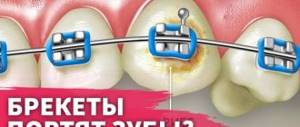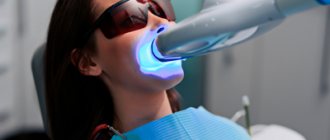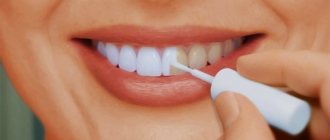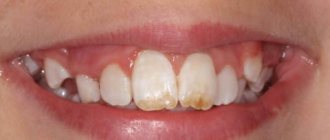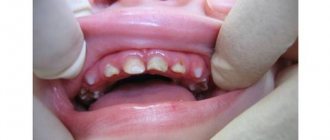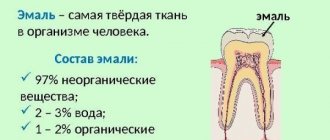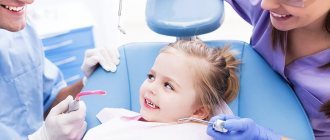It’s rare that a person is not familiar with the sensation of aching teeth and discomfort in the oral cavity. Such manifestations can be associated with both serious dental diseases and minor damage or thinning of the upper layer of dentin. But it is important to find out exactly why your teeth are hurting in order to do everything to eliminate the cause of the problem at home or in the dentist’s office.
Usually, a sharp ache in the teeth appears suddenly, when it is not possible to visit a doctor. But don’t think that this discomfort will disappear soon. Most often, severe pain indicates serious problems that need to be addressed as soon as possible.
Aching teeth: causes of pathology
When a patient comes to see a dentist and asks why his teeth are hurting for no reason, every good doctor will answer that this does not happen. There are always reasons. Any dental problem has its roots, and aching pain in the teeth is no exception. Another point is that the causes of this symptom are quite extensive and can be associated with a number of characteristics of the body and disturbances in the functioning of its systems. Experts identify more than a dozen factors that can cause aching pain in the teeth.
- Congenital hyperesthesia.
Increased sensitivity of enamel can be inherited, which is why a person may experience discomfort when exposed to temperature and chemicals. - Chips, cracks and other damage to the enamel.
Tooth injuries lead to dentin exposure and also facilitate the penetration of pathogenic microorganisms. - Thinning and weakening of enamel.
This can happen for several reasons. First of all, due to a lack of vitamins and minerals. The second common reason is weakening of the enamel as a result of frequent whitening procedures. - Caries and its complications.
Typically, aching pain in the teeth occurs in the middle stages of the disease. - Periodontal diseases in the active stage.
With periodontitis and periodontal disease, the necks of the teeth are exposed, which makes them (and surrounding tissues) very sensitive to irritants. The same applies to the wedge-shaped defect. - Infectious diseases,
especially chronic ones. Influenza, sinusitis, sinusitis - these diseases can sometimes provoke aching pain in the teeth and jaw. - Problems with the gastrointestinal tract.
- Stress, fatigue, lack of sleep.
- Hormonal disbalance.
Often, aching pain in the teeth occurs during pregnancy. - Inflammation of the trigeminal nerve,
when the pain “radiates” to the teeth. - Allergic reaction
to medications.
Apple: benefits and harms for dental health
Good afternoon everyone!
Today on our agenda is a very interesting and important topic for each of us. Apples: benefits and harm for teeth. I think many of us have heard a lot of myths that apples are extremely harmful to teeth and therefore we need to reduce the amount of them in our diet in order to protect our teeth, or eat them after some kind of heat treatment. Today we will figure it out: is this true, what benefits and harm do apples have for teeth, and how to do it in such a way as to minimize the harm to our teeth.
Let's start with the fact that apples are actually the most common fruit in the diet of most people; they are easy to get at virtually any time of the year, and their price is excellent. And this is not surprising, because apple trees are extremely unpretentious trees, and they contain a lot of useful substances.
So we gradually come to the chemical composition of apples:
- Water
- Sugar
- Cellulose
- Starch
- Pectins
- Carotene
- Organic acids
- Microelements: potassium, sodium, iron, manganese, calcium, magnesium, sulfur, aluminum, boron, vanadium, molybdenum
- Vitamins A, C, B1, B2, B6, P, E
Water makes up most of the fruit, so don’t worry about your figure, they are low in calories and are an excellent thirst quencher. The sugar in apples helps normalize metabolism. Fiber helps cleanse the body, removing waste and toxins, and if you eat an apple at night, it will also relieve you from bloating in the morning.
Pectins reduce cholesterol levels in the blood, absorb poisons and toxins that are in the intestines, strengthen our blood vessels, thereby preventing atherosclerosis and the formation of bile stones. Organic acids restore the body after physical activity. The microelements contained in the apple help with anemia and strengthen the cardiovascular system. Vitamins, which are very abundant in apples, help with spring vitamin deficiency.
Now we will tell you about the beneficial properties of apples for the body:
- maintaining visual acuity
- protection against various diseases, especially colds
- helps cleanse the intestines
- weight loss
- reduces the possibility of diabetes mellitus
- prevent anemia
- fight cancer cells
- prevents the formation of gallstones
- fight against cardiovascular diseases
- antitumor effect
- fight against vitamin deficiency
- quick recovery after training
Now let's talk to you about the most important thing, about the effect of apples on our teeth and gums.
I would like to start with the benefits of apples for teeth.
Important! If you do not want to harm your teeth or minimize harm, then buy green varieties of apples; they contain less acids and natural sugars, so the acidity in the mouth will be less than when eating red apples.
- Green apples activate blood circulation in the gums ,
- Good blood circulation will help protect the oral cavity , and this is important in this day and age. It may be a little surprising, but apples can replace a toothbrush .
- If you find yourself in a situation where you don’t have a brush at hand, or it’s some kind of trip and you simply don’t have the opportunity to use it, take an apple with you, it cleanses the enamel of dirt just as well as toothpaste. Moreover, such cleansing is natural and painless.
- Apples saturate our gums with vitamins and minerals.
- Apples protect our teeth from caries , but this can also turn into the opposite, read about it further.
Diagnosis of pathology
For any manifestations of pain and discomfort, you should contact a specialist as soon as possible. Only a qualified doctor can correctly diagnose and identify the exact cause of the problem. If a patient comes with a complaint of aching pain in the teeth, a number of standard diagnostic procedures are first performed:
- visual examination of the oral cavity using a probe;
- tracking reactions to temperature stimuli;
- X-ray examination, which can reveal the presence of hidden problems and complications (granulomas, cysts, etc.).
If the pain and aches in the teeth are not directly related to dentistry, the attending physician refers the patient to other specialists. Most often this is a neurologist and maxillofacial surgeon. The localization of pain also helps to determine the root cause.
- Local.
Aching pain covers one or more teeth. This is usually associated with injuries and dental diseases. In some cases, this is a consequence of infectious diseases. - Generalized.
The entire dentition “aches.” The reasons why all teeth ache are usually associated with pathologies and diseases of the enamel.
The teeth of the lower jaw often ache more (especially the front incisors). In many people, they react more strongly to temperature changes, chemical irritants and inflammation of the trigeminal nerve, when pain responds in the anterior part of the lower jaw. On the other hand, the answer to the question why the lower teeth ache is exactly the same as in the case of the upper teeth: there are no separate reasons.
Pulpitis
Inflammation of the neurovascular bundle of the tooth is one of the most common diagnoses with which patients come to the dentist. Most often, pulpitis occurs due to untreated caries, which destroys the hard tissues of the tooth and reaches its core. As already mentioned, pulpal pain when pressed is very sharp, they are characterized as a “lumbago”. Nerve endings give the most severe symptoms, so it is very difficult to tolerate this phenomenon. You should not rely only on painkillers. It is better to consult a dentist to get timely help for your tooth.
How to treat aching pain in teeth?
A treatment plan is drawn up after the diagnostic results, when the cause of the pathology is identified and pain is localized. Conventionally, several techniques can be distinguished that are used depending on the factors contributing to the occurrence of pain.
- Therapeutic treatment. It is prescribed when the main cause of aching pain is caries or periodontal disease. In case of caries, filling or endodontic treatment is carried out (if bacteria have penetrated the pulp). In case of periodontal inflammation, special ointments and antiseptics are prescribed, curettage is performed, and in severe cases, teeth are splinted.
- Prosthetics. In the presence of a wedge-shaped defect and serious damage, dental prosthetics are performed with single crowns or bridges. In case of enamel pathologies, the doctor may recommend veneers, which are installed to achieve a certain aesthetics.
- Restoration and strengthening of enamel. What to do if all your teeth ache? If the patient has weakened and thinned enamel, it is necessary to strengthen it. First of all, the doctor treats the enamel surface with special compounds based on calcium and phosphorus, and also prescribes a special diet and means that strengthen the immune system and the health of the body.
To eliminate pain, painkillers (Nurofen, Nimesil and others) can be prescribed. If the aching pain is not associated with dental problems, treatment is carried out by doctors of relevant specializations.
Prevention of aching teeth
The best way to prevent an unpleasant symptom is to follow preventive measures. Despite the fact that the enamel itself is very strong, improper lifestyle and exposure to the external environment gradually weaken and destroy it. If you have sensitive enamel, you need to carefully choose hygiene products. In particular, it is recommended to avoid hard toothbrushes and use toothpastes with calcium and fluoride. An equally important point is the right diet. It is necessary to reduce the consumption of spicy, sour and sweet foods to a minimum, and give preference to fermented milk products and foods high in vitamins A and B. Temperature changes are a big stress for sensitive enamel, so the best solution is to drink drinks at room temperature.
Publisher: Expert magazine about dentistry Startsmile.ru
Author of the material: Yaroslav Ikonnikov
How to protect enamel
It is impossible to completely eliminate “harmful” foods from the diet, and it is not always necessary. You can maintain a healthy and beautiful smile by following simple rules.
The first thing you shouldn’t forget is personal hygiene
. It is advisable to brush your teeth after every meal to remove any leftover food. And if morning and evening care procedures involve the use of toothpaste and brushes, during the day it is useful to use dental floss, mouthwash and even chewing gum (the main thing is not to chew for a long time).
Use toothpicks carefully, and only if there is no other alternative. Do not try to remove stuck pieces with a fork, fingernails or sharp objects. This cleaning method will do more harm than good.
Second, it's diet.
. An excess of citrus fruits, frequent consumption of lemonade, hard foods (crackers, dried fruits, candies, etc.), alcohol contribute to the active spread of bacteria that destroy enamel. It is not necessary to completely eliminate foods from your diet unless otherwise recommended by your doctor, but it is worth reducing the frequency and volume of consumption.
What is good for enamel? Sun and vitamin D, strawberries and cottage cheese. These components contribute to the natural restoration of enamel and strengthen it.
Third. Don't forget to seek help and advice from your dentist. The doctor will tell you how to properly care for your mouth and help you choose a restorative (not just cosmetic) toothpaste for regular use.
In addition, in the dental office you will have professional teeth cleaning (it is recommended to do it 1-2 times a year) and remineralization - the process of restoring enamel with the help of special preparations, including fluoride-containing ones.
Quantity
